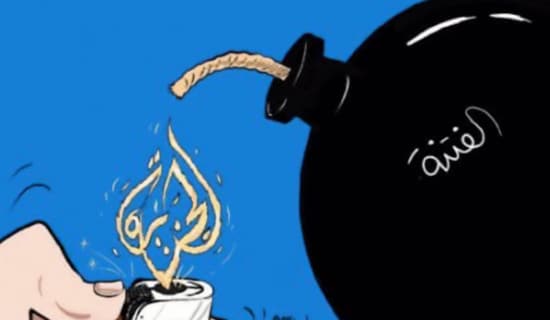Columnist Hazem Saghia writes in the London based Arabic daily Al-Hayat on February 28, 2001: "[We in] the Middle East are under the illusion that the world waits for us and will wait for us forever. So we can take our time as well as the time of others since time is on our side and the future is ahead of us. These illusions are understandable when they are limited to ruling regimes and elites. For them it is not an illusion rather an intended [policy for] winning time. [However] the people are also responsible for it because they keep talking about it, chewing on it and [ultimately] they pay the price."
"The modern world is engaged in an unprecedented technological and communications revolution. [But] we are busy with questions and concerns that belong to the cold war era or to the time of the creation of independent [Arab] states in the 1940s, or the first encounter between the Arab world and the West in the late 19th century."
"While [the Arabs] discuss questions of fundamentalism, modernism, tradition, etc. - Arab politics continues to be engaged in questions such as: Is it allowed to dismantle one party rule in Syria, to renounce Saddam Hussein in Iraq, and to stop preserving Yasser Arafat's rule in Palestine?"
"Rarely does someone talk about the need to achieve investment, to stop the emigration of youth [out of the Arab world], about educating the youth to have the qualifications demanded by the global economy about the development of regional water resources, about freedom, about the status of women, etc."
"Instead we hear common claims that the situation could not be better. Do you want democracy [ask the Arab regimes] and become like Israel?... Do you want [foreign] investment in order to join globalization?"
"Turning our back to the technological revolution which changes everything in modern life endangers... Even if we were to succeed in such a policy, which is doubtful, we would have turned into anthropological species that the world would watch. We would have regained the land [from Israel] only to make it into a windswept dessert and we would have achieved national liberation only to move our legs in full freedom in a river whose water has dried out."
"These words do not mean to understate the importance of returning the land or achieving liberation. Rather they intend to emphasize that these achievements will be no more than a framework if they are not filled with substance, if there is no modern economy or education."
"The missed opportunity of our generation will be nothing but a return to square one. Because of such policies we have missed opportunities to take advantage of great world events."
"We gave priority to a policy of confrontation [with Israel] while postponing progress in the hope of completely achieving our rights. In order to justify this approach we said that progress is against us and is intended to plunder our treasures."
"Since then the treasures have diminished and so did progress, as well as our rights. Only dictatorship is spreading [in the Arab world] while we are pushed to follow [the model of] the one party states that collapsed not only in the Soviet Union but also in South Korea, Mexico and Taiwan. Nor has a leader emerged amongst us that would have the modesty of Nicaragua dictator Daniel Ortega who accepted without bloodshed the results of the peaceful elections that demoted him."
"We are still confident that our future is ahead of us and it is a glorious future, but this future will remain ahead of us forever."
The Legacy of Peace
In the Egyptian government sponsored daily Al-Ahram, liberal columnist Ridha Hilal discusses the collapse of the peace process and the return to the "Old Middle East":
"The election of Ariel Sharon to head the Israeli government may become, needless to say, a negative development in the Middle East."
"However, the question who was responsible for Sharon's rise and for the missed opportunity to reach a final peace agreement between the Palestinians and Israel -- was it Clinton, Barak or Arafat -- is unimportant at this point. What is important is that the peace process based on Oslo and Madrid has collapsed, died, and [now] waits for its burial."
"The peace process in the Middle East was tied since 1991 - at least at the level of hopes -- to the idea of the 'New Middle East' which will be ruled by new values and ideas."
"The most important values were a turn to a peaceful resolution to the Arab-Israeli conflict as a substitute to the military solution, and a turn to a regional system based on economics [an Arab common Market] as a substitute to the old Arab regional system based on Arab unity which was ended by the Iraqi invasion of Kuwait.[1] Another value was the efforts to enter into the new world order that will enforce economic freedom, competition in the global economy, democracy, and respect for human rights."
"Unfortunately, the collapse of the peace process has raised to the surface a Middle East that rebels against itself and goes back to its old slogans, to its newspapers and TVs where one can find threats of war in reaction to threats coming from central members of Sharon's government such as Lieberman and Ze'evi. One columnist even suggested that Arab leaders should go to Baghdad to align themselves with President Saddam Hussein."
"The calls for democracy and economic prosperity disappeared in favor of the slogan: '"No voice should rise above the voice of battle"', a slogan that returns to our life as if we are forever doomed to wallow in the mud of violence, dictatorship and poverty."
"The Middle East faces a crossroads which it will either cross or go backward. What needs to be said at this point is that there is a difference between peace and the peace process. Even if the peace process is dead, the peace is not. It continues to be a strategic goal, even when the peace process will be buried, its legacy will continue... The most important thing in the Oslo legacy is the assertion that the failure of the peace process may entail the danger of a return to the "Old Middle East"."
"[Therefore] against the pessimism regarding the present situation there must emerge an optimistic resolve to reach economic progress and democracy."
[1] See Hilal's criticism of the pro-Iraqi Lobby in MEMRI Special Dispatch 196, "An Egyptian Columnist Attacks Pro-Iraqi Arab Lobby," March 22, 2001.




